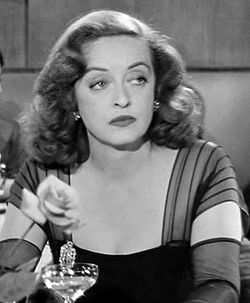 Davis in 1938 | ||||||||||||||||||||||
| ||||||||||||||||||||||
| Totals [a] | ||||||||||||||||||||||
|---|---|---|---|---|---|---|---|---|---|---|---|---|---|---|---|---|---|---|---|---|---|---|
| Wins | 34 | |||||||||||||||||||||
| Nominations | 62 | |||||||||||||||||||||
Note
| ||||||||||||||||||||||
| ||
|---|---|---|
This is a list of Bette Davis 's accolades for both her cinematic and television performances. Her career spans over six decades, from the beginning of the 1930s until the end of the 1980s, shortly before her death.
Contents
- Major awards
- Academy Awards
- BAFTA Awards
- Golden Globe Awards
- Emmy Awards
- Industry awards
- Other accolades
- Honorary
- Miscellaneous
- See also
- Notes
- References
- External links
Her first acting "award" was being cited, alongside Joan Blondell and Ginger Rogers, as one of the "Stars of Tomorrow" in 1932. But it was two years later, when she had her breakthrough performance as Mildred Rogers in Of Human Bondage (1934), when she received her first major awards notice, or lack thereof. When the Academy Award nominations were announced and Davis's name was omitted, there was an uproar. The Academy was inundated with write-in votes demanding that she be nominated. [1] Due to that popular demand, they permitted Davis's name to remain a write-in candidate, even though she was not an official nominee. She finished third in the votes. [2] (They allowed this relaxed rule for the following year as well, wherein Paul Muni was a write-in nominee for Black Fury (1935). Despite being unofficial, he finished second in the votes. The academy discontinued this option as of 1936.) [3]
When Muni receive his write-in, Davis received her first Oscar for Best Actress, for the film Dangerous (1935). [4] Three years later, she would win again for Jezebel (1938). [5] Beginning with this film, she next set a record for the most consecutive nominations, receiving five in a row from 1938 through 1942. [6] These succeeding four films were Dark Victory (1939), [7] The Letter (1940), [8] The Little Foxes (1941), [9] and Now, Voyager (1942). [10] Her longstanding record would shortly be tied by Greer Garson, whose span went from 1941 to 1945 (with a win for 1942's Mrs. Miniver ). [11] She and Davis had two overlapping years, plus a third year where they were simultaneously nominated when Davis received her next nomination for Mr. Skeffington (1944). [12]
Aside from Academy Awards, Davis also acquired a Volpi Cup for Best Actress in 1937 for both Marked Woman and Kid Galahad —the only recipient in their history to receive the prize for two performances. In addition to that, she received two Best Actress wins from the National Board of Review: one shared prize for both The Old Maid (1939) & Dark Victory; and another two years later, for The Little Foxes.
At this time, Davis had more acting Oscar nominations than anyone else. This streak continued with All About Eve (1950). [13] She also received several other nominations and wins for this performance, including: Cannes Film Festival Award for Best Actress, New York Film Critics Circle Award for Best Actress, and her first Golden Globe nomination. Her next Oscar nomination was for The Star (1952). [14]
One decade later, Davis continued receiving recognition for a variety of roles. She earned a Golden Globe Award for Best Actress – Motion Picture Comedy or Musical nomination for Pocketful of Miracles (1961), [15] with adjacent nominations the following year for What Ever Happened to Baby Jane? (1962) from a Golden Globe Award for Best Actress in a Motion Picture – Drama, to a BAFTA for Best Foreign Actress, and finally, an Academy Award for Best Actress—her 10th official of the latter (or 11th, counting the write-in nomination). [16] She thus became the first actress to reach double digits in her nominations tally. [17]
Davis continued receiving several other awards and nominations, including 3rd Place from the Laurel Awards for ...Baby Jane? followed by a win for her performance in Hush...Hush, Sweet Charlotte (1964). [18]
In her later years, she set her sights more often on television. She received four Primetime Emmy nominations, for an episode of ABC's Wide World of Entertainment retroactive special; plus Little Gloria...Happy at Last (1983); White Mama (1980); and Strangers: The Story of a Mother and Daughter (1979), for which she won an Emmy opposite Gena Rowlands. [19]
She was also bestowed an honorary Cecil B. DeMille Award at the Golden Globes ceremony in 1974; [20] an AFI Life Achievement Award in 1977; [19] and a Kennedy Center Honors in 1987. [19] These are just a few of the vast assortment of honorary awards she has received in addition to the aforementioned major accolades above.





